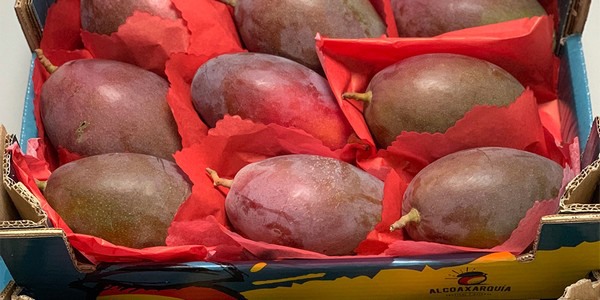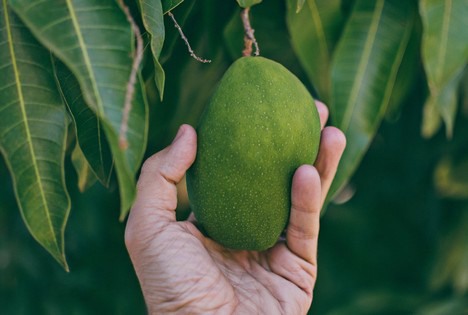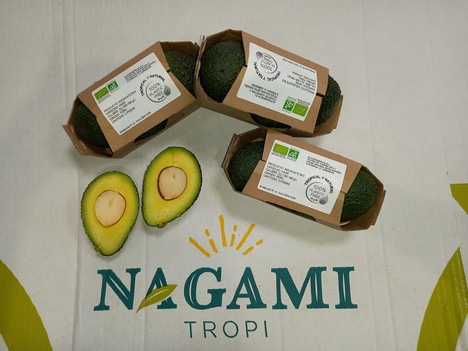Malaga's mangoes, which the market had been expecting, have already hit the shelves. "In the earliest farms of the Axarquia we have already harvested mangoes of the Tommy Atkins variety, and this week we will start with the first Osteen of the season in some specific plots where they have already reached the optimum Brix degrees. However, the bulk of the campaign will start at the end of week 36, from September 8-10," says Jose Antonio Alconchel, CEO of the Malaga-based company Alcoaxarquia.
"The first sales have already been made and we can see that the market is very interested in Spanish mangoes. Also, this year's quality is very good, better than last year's, with fruit with a very good color and larger sizes than in previous years," he says.

The mangoes produced in Malaga are arriving on the market right after the end of Senegal's campaign, which finished this week, although they will share the shelves with the fruit from Brazil. "Brazilian mangoes are being sold for 3-4 Euro a box. That is a price we cannot compete with, but our advantage over Brazil is our proximity and quality. In fact, the products are marketed by different customers and chains. Brazilian mangoes tend to go to discounters and our mangoes are sold by more demanding supermarkets, such as Intermarché, Carrefour or Rewe. A Palmer transported by ship from Brazil is not the same as a tree-ripened Osteen from Spain," said José Antonio.
"However, this year we see that the prices of all products are somewhat more balanced than last year. This applies to both mangoes and avocados. I think that after the boom recorded during the pandemic, the time has come for them to stabilize. This year, the prices at the beginning of the mango season are more moderate. We are entering the market almost directly with full season prices."

Alcoaxarquia, which has increased its mango production in Spain by between 10 and 15% this year, will supply the fruit grown in the Axarquia region until November, when the mangoes from the plantations that the producing and marketing company has in Peru will take over. That's also where they produce avocados, another important product in its portfolio.
"We are currently marketing our avocados grown in Peru, and we will continue for another month until we start with the Spanish campaign, which will kick off at the end of September with the first Bacon," says the CEO of Alcoaxarquia.

When it comes to avocados, the company has achieved a significant 40% increase in its turnover in the first half of the year alone, which marks three years of growth that have led to new projects and investments being made in the two countries in which it operates.
"In Spain, we have opted to diversify our production areas in provinces such as Huelva, Cadiz and Granada to respond to the water shortage problems, and we have recently planted a farm in Huelva. In Peru, where we have 600 hectares under cultivation, we have finished building our own handling plant with capacity for up to 500 containers for the next season."
In any case, the investments made have not been limited to the subtropical fruit industry. "We have also successfully set up new facilities to process our organic citrus and stop using the avocado line we had, which we have also modernized," says José Antonio Alconchel.
This year, in fact, Alcoaxarquia will have a 30% greater volume of bio oranges, which are grown in Andalusia, and will introduce organic lemons to its range for the first time. "Unlike in the Region of Valencia, where a drop in the citrus production is expected as a result of the weather, and also because of the impact of the cotonet pest, in Andalusia we have around 5% more production than last year," says José Antonio. "This applies especially to the late varieties, with which we had problems last year. In the organic citrus segment, the biggest competitor is Greece, but this last season there was no fruit, so, despite that failure, we did well in the end."

"Between Peru and Spain, we have invested a combined total of more than 2.5 million Euro. For us, this is a way to stay alive. We have a great team of professionals all rowing in the same direction, with the desire to continue growing despite all the adversities we have had to face, from the pandemic to the political problems in Peru," says the CEO of Alcoaxarquía.
 For more information:
For more information:
José Antonio Alconchel
Alcoaxarquía
M: +34 607396517
T: +34 951 33 39 34
joseantonio@alcoaxarquia.es
www.alcoaxarquia.com
